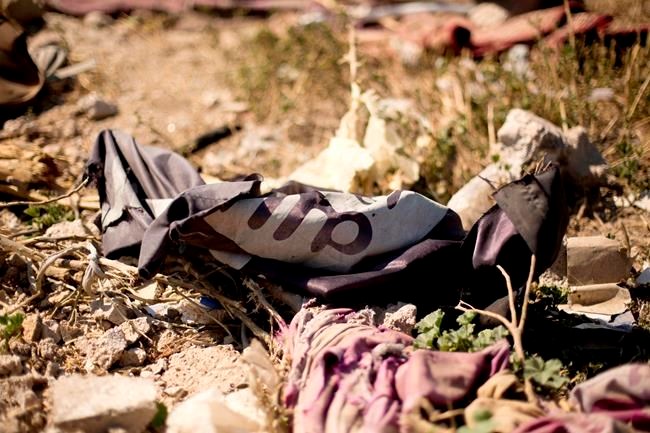A Canadian man alleged to be a leading Islamic State media figure and foreign fighter has been charged in U.S. federal court with conspiring to provide material support to a foreign terrorist organization resulting in death, federal officials said Saturday.
Mohammed Khalifa, a Saudi-born Canadian citizen who was a leading figure in the Islamic State of Iraq, was captured overseas by the Syrian Democratic Forces in January 2019, federal officials said. He was recently transferred into FBI custody, at which point he was first brought to the Eastern District of Virginia where the charges were laid.
"As alleged, Mohammed Khalifa not only fought for ISIS on the battlefield in Syria, but he was also the voice behind the violence," said Raj Parekh, Acting U.S. Attorney for the Eastern District of Virginia.
"Through his alleged leading role in translating, narrating, and advancing ISIS’s online propaganda, Khalifa promoted the terrorist group, furthered its worldwide recruitment efforts, and expanded the reach of videos that glorified the horrific murders and indiscriminate cruelty of ISIS."
Khalifa, 38, served in prominent roles within the Islamic State starting in 2013 and continuing until his capture by the SDF in January 2019 following a firefight between Islamic State fighters and the SDF, officials said.
In addition to allegedly serving as an Islamic State fighter, Khalifa allegedly served as a lead translator in the group's propaganda production and was the English-speaking narrator on multiple violent recruitment videos.
The federal court complaint alleges Khalifa travelled to Syria in the spring of 2013 from Toronto with the intent of becoming a foreign fighter and ultimately joining the Islamic State.
He joined the group in or around November 2013 and swore allegiance to then-Islamic State leader Abu Bakr al-Baghdadi. In early 2014, he was recruited to join the group's Media Bureau partly due to his linguistic capabilities as a fluent English and Arabic speaker.
Prosecutors say Khalifa played an important role in producing and disseminating Islamic State propaganda across multiple media platforms targeting Western audiences.
The complaint said he focused primarily on enticing supporters to travel to Islamic State-controlled areas to join or to conduct attacks in the West, including in the United States, on the group's behalf. He also actively participated in armed hostilities on behalf of the Islamic State, according to the court documents.
The complaint alleges Khalifa assisted in the translation and narration of approximately 15 total videos created and distributed by the Islamic State. The productions narrated by Khalifa include two of the most influential and exceedingly violent propaganda videos, the complaint said.
The videos, containing English narration by Khalifa, were part of a media campaign promoting attacks committed against U.S. citizens and those from other countries in order to incite further violence against the United States, allied nations and their residents.
The videos show glamorized portrayals of the Islamic State and its fighters as well as scenes of violence, including depictions of unarmed prisoners being executed, images of Islamic State attacks in the United States, and footage of attacks and fighting in what is described as Syria and Egypt, a news release from the U.S. attorney's office said.
Amarnath Amarasingam, a Queen's University professor who specializes in terrorism, radicalization and extremism research, met Khalifa — who also goes by the name Abu Ridwan Ai-Kanadi — in 2019 along with Global News.
He said Khalifa was "a deeply ideologically committed member of the Islamic State" until his capture.
"The ISIS higher ups also saw value in him as a media personnel, and he travelled with much of the leadership to the final holdouts," Amarasingam said in an email.
"One of the key things he mentioned during our interview was that ISIS, as it was losing territory, started to see consistent media releases as strategically important."
Amarasingam said he's surprised the Canadian government didn't charge him.
"Because of all the Canadian prisoners being held in Syria, Ridwan is probably the easiest to make a case against," Amarasingam said.
"There are literally hundreds of hours of ISIS audio that he put out there, and has also admitted to multiple reporters that this was his primary role with the Islamic State."
Leah West, a professor at Carleton University who studies national security law,also metKhalifa.
She said bringing ISIS members to justice is incredibly important.
"Those who left Canada to support the terror organization need to be held accountable for their crimes before a court of law," West said.
"I’m glad the U.S. had the political courage to do what the Canadian government did not. He is a Canadian, he left from Canada. It should be the responsibility of the Canadian government to hold him accountable for his crimes."
West described Khalifa as "calm, cold, and indifferent."
"He had no remorse for what he had done and felt his actions were justified," she said.
If convicted, Khalifa faces a maximum penalty of life in prison.
The federal Department of Justice did not immediately respond to a request for comment.
This report by The Canadian Press was first published Oct. 2, 2021.
— With files from The Associated Press
Liam Casey, The Associated Press




